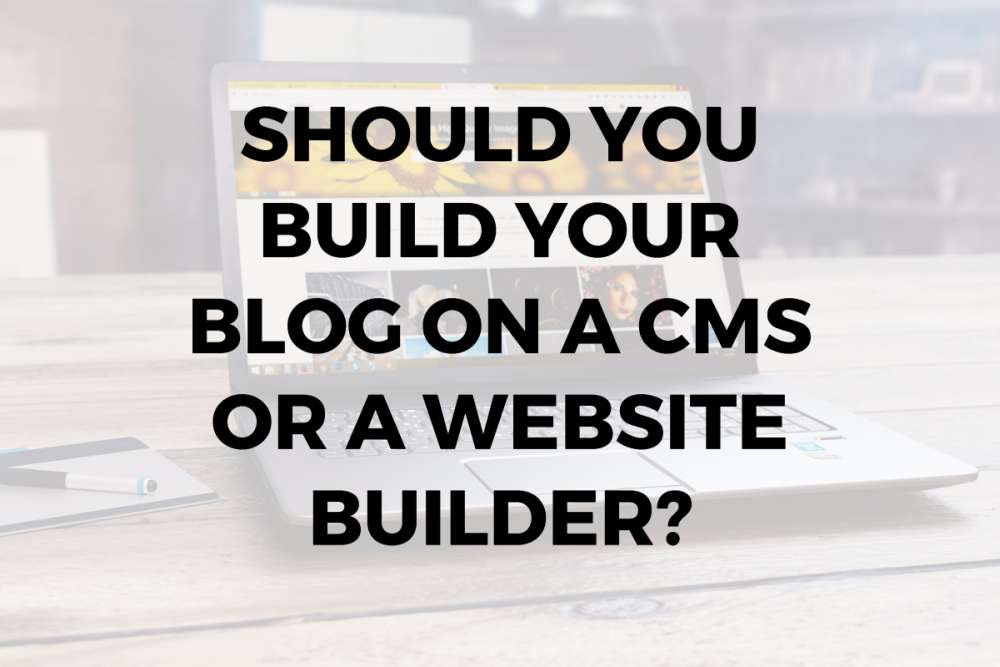Should You Build Your Blog on a CMS or a Website Builder?

Your blog is your business. Any decision you make about your blog requires you to perform extensive research and careful thinking, especially if you are building your blog from scratch.
Therefore, a question begs to be asked: where do you plan on creating your blog?
You have two choices when it comes to approaching this issue: a CMS or a website builder.
Before you proceed with developing a blogging strategy, you need to figure how the platform you will use for your blog. Below are explanations about each platform and factors you need to consider to help you make an informed and well-thought-out decision.
What is a Website Builder?
A site builder like Weebly, Wix, or Squarespace is for those who want to build their sites in the quickest way possible. Website builders have a drag and drop interface that can save you lots of time and money because most of its features are pre-built and ready to go live.
What is CMS?
CMS or Content Management System is a piece of software that you’ll install on your computer to edit and manage your site. Popular examples of CMS are WordPress, Joomla, and Drupal. WordPress, being the most famous one, is customizable with themes and plugins that are available with thousands of choices from different sites.
Consider these Things First
While both website builder and CMS have their pros and cons, first, evaluate what’s best for you and your blog using these list below:
Technical Skills

Building a blog through CMS can take some time especially if you have little to no technical expertise. CMS can be powerful, but they require a bit of a learning curve to perfect. One challenge, for example, is to edit a certain function or design of a theme, you’ll have to tweak some of its code. So aside from learning the platform itself, you’ll also need to know some basic HTML and CSS coding.
On the other hand, website builders are relatively easy to use since you only have to drag, drop, and arrange menus and functionalities on your site. However, they are less robust than CMS. Most of them don’t allow their users to modify codes, which makes them constrictive to people who wish full control of their blog.
Hosting
With website builders, hosting is something that you don’t have to worry about because it is already part of the package. So Just punch in your domain name, connect it to your website builder, and you’re ready to go.
On CMS, you’re going to have to find a host and configure it by yourself. While it can be intimidating to do so, the key here is the extensive flexibility that your site can do. For example, if you use WordPress, if something were to happen, you can download the entirety of your site and transfer it to another web host.
Cost
The cost of a website depends on a number of factors.
As mentioned, website builders are time savers but can be costly as well. But if you don’t mind paying extra for a package that includes hosting, tools, and easy-to-use interface, then going with a website builder can be a money saver too.
In contrast, the cost of a CMS could be based on different factors as well such as hosting type, themes, plugins, and other tools that you will be using throughout your blogging business.
Which is Better?
A website builder may seem like a better choice for those new to blogging. And even with its limitations, you’ll still find what you are looking for 90% of the time.
On the other side, we recommend using CMS if you want to practice your website building skills, have more time to experiment, and is looking for a particular blog design. CMS is also ready for more extended functionalities through the use of 3rd party plugins and tools.
In conclusion, determining which is better for your blog is a very personal choice.
What’s Best for You?
If you need one right now and don’t want to hassle yourself learning every bits and piece of building a new site, then choosing a website builder is right for you.
If you can delegate time creating a site jampacked with useful features, then a CMS would be best.
Lastly, your decision on what platform to use depends entirely on your needs as a blogger.
Just take note that whatever you pick should be beneficial to your blogging business. In the end, what you want is a functional website that can represent your business professionally and elegantly.
Related posts:
2017 Most Unique and Friendliest CMS for Small Businesses
Freelance writer for hire by day. Heavy sleeper at night. Dreams of non-existent brass rings. Writer by trade. Pro wrestling fan by choice (It's still real to me, damnit!). Family man all the time.

